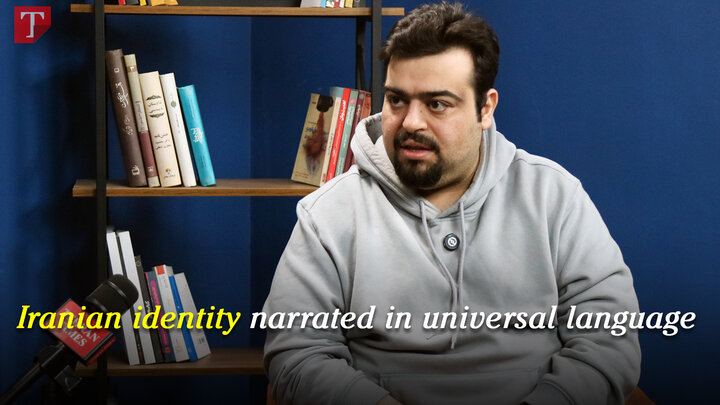-
 2026-01-24 20:45
2026-01-24 20:45
By Saleh Abidi Maleki
No anxiety in Tehran as commanders declare readiness for war
Top officials express confidence that US aggression failed once—and will fail again, this time at a much heavier cost
TEHRAN – Iran’s top military officials looked relaxed and in high spirits as they gathered for an annual meeting marking National Islamic Revolution Guard Corps (IRGC) Day. Speaking to an IRIB reporter who managed to gain access to the gathering, the commanders commented on the growing prospects of another war with the United States with visible confidence.
-

Trump’s ‘support for Iranians’ masks economic warfare and narrative manipulation: Senior analyst
Elija J. Magnier argues US strategy weaponizes dissent while sanctions intensify civilian hardship
TEHRAN- In an interview with the Tehran Times, veteran war correspondent and geopolitical analyst Elijah J. Magnier delivers a rigorous and unflinching analysis of U.S. and Israeli pressure tactics against Iran, situating them within a long-standing architecture of coercion, narrative warfare, and regional destabilisation.
-

By Xavier Villar
Power in Iran: A realist analysis by John Mearsheimer
TEHRAN - The protests recorded in Iran at the end of 2025 and the beginning of 2026 have primarily been interpreted as the expression of accumulated economic and social tensions. This reading, focused on domestic factors, identifies real elements, such as persistent inflationary pressure. In many analyses, these factors appear sufficient to explain both the scale of the mobilizations and the subsequent response by the authorities.
-

By Fatemeh Kavand
Iran’s response will open the gates of hell
TEHRAN - In a report by Axios correspondent Barak Ravid, it is stated that despite announcing military readiness to attack Iran, Donald Trump abruptly canceled the strike in the final hours of Wednesday as a result of pressure from his regional allies.
-

By staff writer
A state in protest: Is Minnesota becoming the fault line of US immigration policy?
TEHRAN — Recent events in the US state of Minnesota have exposed the deep tensions created by President Donald Trump’s immigration strategy. The mass protests on Friday, the widespread business shutdowns, and the willingness of thousands to gather in dangerous cold weather show a community reacting forcefully to a federal operation it sees as excessive and harmful.
-

Iran moving quickly to fix security gaps: Interior official
TEHRAN – Following a year marked by a direct military confrontation with the United States and a subsequent wave of foreign-backed riots, a senior Iranian official expressed confidence in the Islamic Republic’s security apparatus this week, promising that the country is moving quickly to seal gaps exploited by its adversaries.
Politics
-

Leader’s representatives visit individuals disabled during 1980-88 war, recent riots
TEHRAN - Over a dozen delegations representing Islamic Revolution Leader Ayatollah Seyyed Ali Khamenei have visited disabled war veterans who sustained injuries during the eight-year Iraqi war on Iran in the 1980s.
-

Iran rejects Western-backed UN mandates as ‘human rights weaponization’ for political gain
TEHRAN – Iran has formally rejected a resolution adopted in the 39th Special Session of the United Nations Human Rights Council (UNHRC) on Saturday, denouncing the move as a “blatantly politicized action.”
-

US, Israel hatched ‘false-flag killings’ plot to stir unrest in Iran: top MP
TEHRAN - A senior Iranian parliamentarian says the US and the Israeli regime were pursuing a policy of “false-flag killings” during the recent riots in Iran.
Sports
-

Asgari wins bronze at Karate One Premier League
TEHRAN – Bahman Asgari Ghoncheh of Iran claimed a bronze medal at the Karate One Premier League Istanbul on Sunday.
-

Iran to play Cameroon in friendly
TEHRAN - Iran’s national football team will step up their preparations for the 2026 FIFA World Cup with a high-profile friendly against Cameroon on March 30 in Istanbul.
-

Iran's U23 football crisis: A cycle of failure and fading Olympic dreams
TEHRAN - Iran's U23 national football team have hit a new, embarrassing low. Their recent exit from the 2026 AFC U23 Asian Cup in Saudi Arabia was not just a disappointment; it was a systemic failure that exposes deep-rooted problems within Iranian football's youth development structure.
Culture
-

12th Kolkata International Children’s Film Festival screening Iranian modern, classic movies
TEHRAN – Five films from Iran are present at the 12th Kolkata International Children’s Film Festival, which is underway in India.
-

44th Fajr Film Festival to be held in February with 31 films vying for Crystal Simorgh
TEHRAN – The 44th Fajr National Film Festival will be inaugurated at Mellat Cineplex in Tehran on February 1, setting the stage for ten days of artistic celebration and competition.
-

Yorgos Lanthimos’s “Bugonia” reviewed at Arasbaran Cultural Center
TEHRAN – Arasbaran Cultural Center in Tehran screened the 2025 dark comedy film “Bugonia” directed by Yorgos Lanthimos on Sunday.
Economy
-

Iran road transit holds at 12.4m tons despite disruptions
TEHRAN – Iran recorded 12.44 million tons of road transit cargo in the first nine months of the current Iranian year (march-December, 2025), maintaining volumes broadly in line with last year despite regional tensions and infrastructure incidents, a senior transport official said.
-

Iran to host pavilion at Afghanistan construction industry fair
TEHRAN – Iran has approved the organization of a national pavilion at the Afghanistan International Specialized Construction Industry Exhibition, scheduled to be held in Kabul in February 2026, the Trade Promotion Organization of Iran (TPO) said.
-

Customs clearance eased after FX reform, says trade official
TEHRAN – Iran has eased logistics and customs procedures for essential goods, raw materials and production equipment following the unification of exchange rates, with no shortages reported in basic supplies, a senior trade official said.
Society
-

Over 70 diagnostic, therapeutic radiopharmaceuticals being produced in Iran
TEHRAN – Iran has achieved a distinguished position in the region in the field of radiopharmaceuticals and biotechnological drugs, manufacturing 70 types of diagnostic and therapeutic radiopharmaceuticals domestically, the head of the Food and Drug Administration (FDA) has said.
-

Some 1.7% of Iranians donate blood regularly
TEHRAN – Around 1.7 percent of the country's population donates blood regularly, and the blood donation index is 28 per 1,000 population, an official with Iran Blood Transfusion Organization (IBTO) has said.
-

Intl. Day of Clean Energy highlights inclusive energy transitions
TEHRAN – Marked on January 26 every year, the International Day of Clean Energy aims to drive equitable and sustainable energy transitions, leaving no one behind and protecting the planet.
Tourism
-

Heritage sites in Fars province to be monitored by drones
TEHRAN – Fars’ cultural heritage department is set to use drones and electronic monitoring systems to oversee nationally and globally registered heritage sites scattered across the southern Iranian province.
-

National education platform for creative industries and handicrafts unveiled in Tehran
TEHRAN - Iran on Saturday unveiled the first phase of a national educational platform covering creative industries, handicrafts and library and museum skills at the Malek National Library and Museum in downtown Tehran.
-

Vivid colors of Qashqai carpets enliven black tents
TEHRAN — The vivid colors and distinctive designs of Qashqai carpets add visual richness to Siah-Chadors, the traditional black tents used by Iran’s nomadic communities. Such an striking contrast, seen in only a few places worldwide, has drawn attention to the artistry and cultural value of Qashqai weaving.
International
-

A state in protest: Is Minnesota becoming the fault line of US immigration policy?
TEHRAN — Recent events in the US state of Minnesota have exposed the deep tensions created by President Donald Trump’s immigration strategy. The mass protests on Friday, the widespread business shutdowns, and the willingness of thousands to gather in dangerous cold weather show a community reacting forcefully to a federal operation it sees as excessive and harmful.
-

What Palestinians endure in Gaza amid Israel’s continued demolition and siege
TEHRAN — Palestinians in Gaza are hoping for real changes that could ease their suffering and help them survive the harsh reality they face.
-

The US and Lebanon’s trilateral trap
BEIRUT — The United States is intensifying pressure on Lebanon to abandon the existing military “mechanism” overseeing the southern front and move instead toward a Washington-sponsored trilateral committee that would pave the way for political-security arrangements with Israel.
Most Viewed
-
No anxiety in Tehran as commanders declare readiness for war
-
Iran’s response will open the gates of hell
-
Power in Iran: A realist analysis by John Mearsheimer
-
Trump, Iran International, and the dream of saving Iran
-
Pezeshkian: Enemies wrought recent crisis in revenge for defeat in 12-Day War
-
How the Iranian diaspora shapes Western views of Iran
-
Trump’s ‘support for Iranians’ masks economic warfare and narrative manipulation: Senior analyst
-
Iran, the collapse of Western strategy - where empires lose the plot
-
Beyond the headlines of 3117 dead: Security body unmasks the architects of urban warfare
-
US-Israeli strategy in Iran reflects long-term regime change tactics: Pakistani expert
-
Iranian FM calls Zelenskyy ‘confused clown’
-
Iran moving quickly to fix security gaps: Interior official
-
Major infrastructure projects inaugurated in Chabahar Port
-
Turkey’s Fidan opposes any US military aggression against Iran
-
IRGC intelligence arm foiled recent US-Israeli plot against Iran: statement












